Investigating Factors Affecting Primary Education Performance UK
VerifiedAdded on 2023/04/22
|30
|9703
|399
Report
AI Summary
This report investigates the factors contributing to low performance in primary education among children in the UK. The study identifies key issues such as large class sizes, single-parent households, traditional teaching methods, teacher competency, and lack of parental involvement as significant contributors to poor academic outcomes. The research employs a systematic approach, including literature review, research methodology, and data analysis using both thematic and statistical methods. Findings emphasize the importance of parental engagement in improving student performance and highlight the need for enhanced teaching and learning strategies in the UK education system, advocating for student-centered approaches, digital integration, play-based learning, and the EPPSE model to foster better educational outcomes.
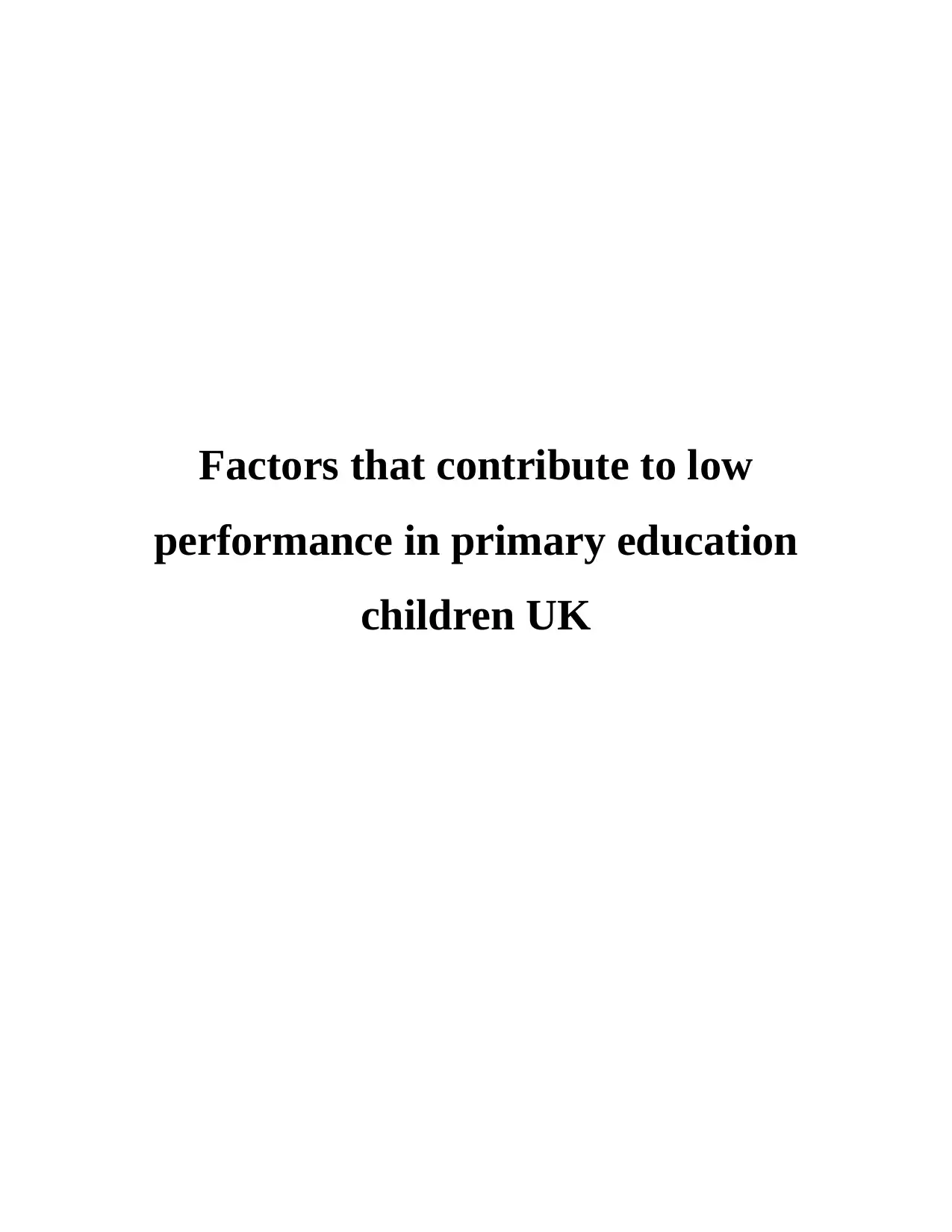
Factors that contribute to low
performance in primary education
children UK
performance in primary education
children UK
Paraphrase This Document
Need a fresh take? Get an instant paraphrase of this document with our AI Paraphraser
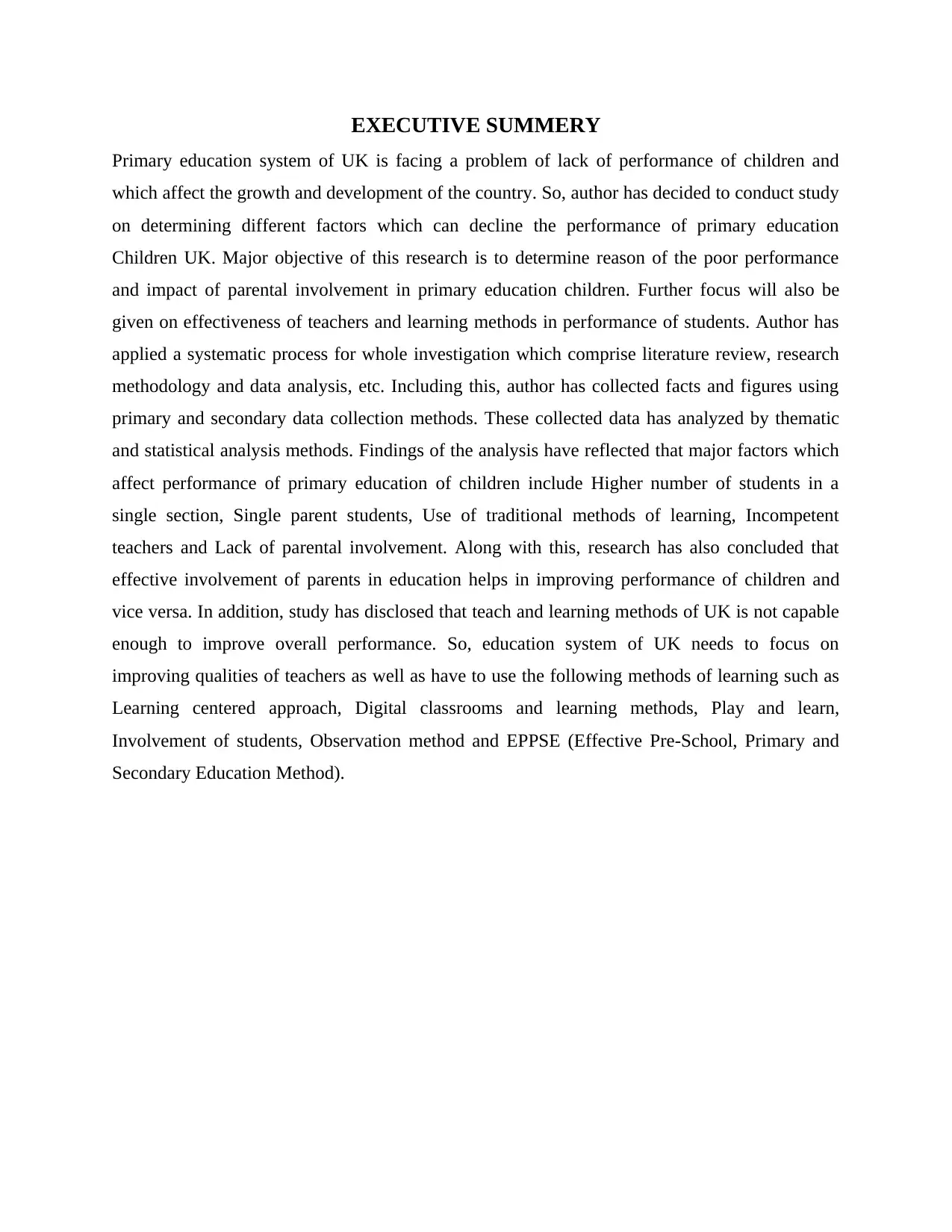
EXECUTIVE SUMMERY
Primary education system of UK is facing a problem of lack of performance of children and
which affect the growth and development of the country. So, author has decided to conduct study
on determining different factors which can decline the performance of primary education
Children UK. Major objective of this research is to determine reason of the poor performance
and impact of parental involvement in primary education children. Further focus will also be
given on effectiveness of teachers and learning methods in performance of students. Author has
applied a systematic process for whole investigation which comprise literature review, research
methodology and data analysis, etc. Including this, author has collected facts and figures using
primary and secondary data collection methods. These collected data has analyzed by thematic
and statistical analysis methods. Findings of the analysis have reflected that major factors which
affect performance of primary education of children include Higher number of students in a
single section, Single parent students, Use of traditional methods of learning, Incompetent
teachers and Lack of parental involvement. Along with this, research has also concluded that
effective involvement of parents in education helps in improving performance of children and
vice versa. In addition, study has disclosed that teach and learning methods of UK is not capable
enough to improve overall performance. So, education system of UK needs to focus on
improving qualities of teachers as well as have to use the following methods of learning such as
Learning centered approach, Digital classrooms and learning methods, Play and learn,
Involvement of students, Observation method and EPPSE (Effective Pre-School, Primary and
Secondary Education Method).
Primary education system of UK is facing a problem of lack of performance of children and
which affect the growth and development of the country. So, author has decided to conduct study
on determining different factors which can decline the performance of primary education
Children UK. Major objective of this research is to determine reason of the poor performance
and impact of parental involvement in primary education children. Further focus will also be
given on effectiveness of teachers and learning methods in performance of students. Author has
applied a systematic process for whole investigation which comprise literature review, research
methodology and data analysis, etc. Including this, author has collected facts and figures using
primary and secondary data collection methods. These collected data has analyzed by thematic
and statistical analysis methods. Findings of the analysis have reflected that major factors which
affect performance of primary education of children include Higher number of students in a
single section, Single parent students, Use of traditional methods of learning, Incompetent
teachers and Lack of parental involvement. Along with this, research has also concluded that
effective involvement of parents in education helps in improving performance of children and
vice versa. In addition, study has disclosed that teach and learning methods of UK is not capable
enough to improve overall performance. So, education system of UK needs to focus on
improving qualities of teachers as well as have to use the following methods of learning such as
Learning centered approach, Digital classrooms and learning methods, Play and learn,
Involvement of students, Observation method and EPPSE (Effective Pre-School, Primary and
Secondary Education Method).
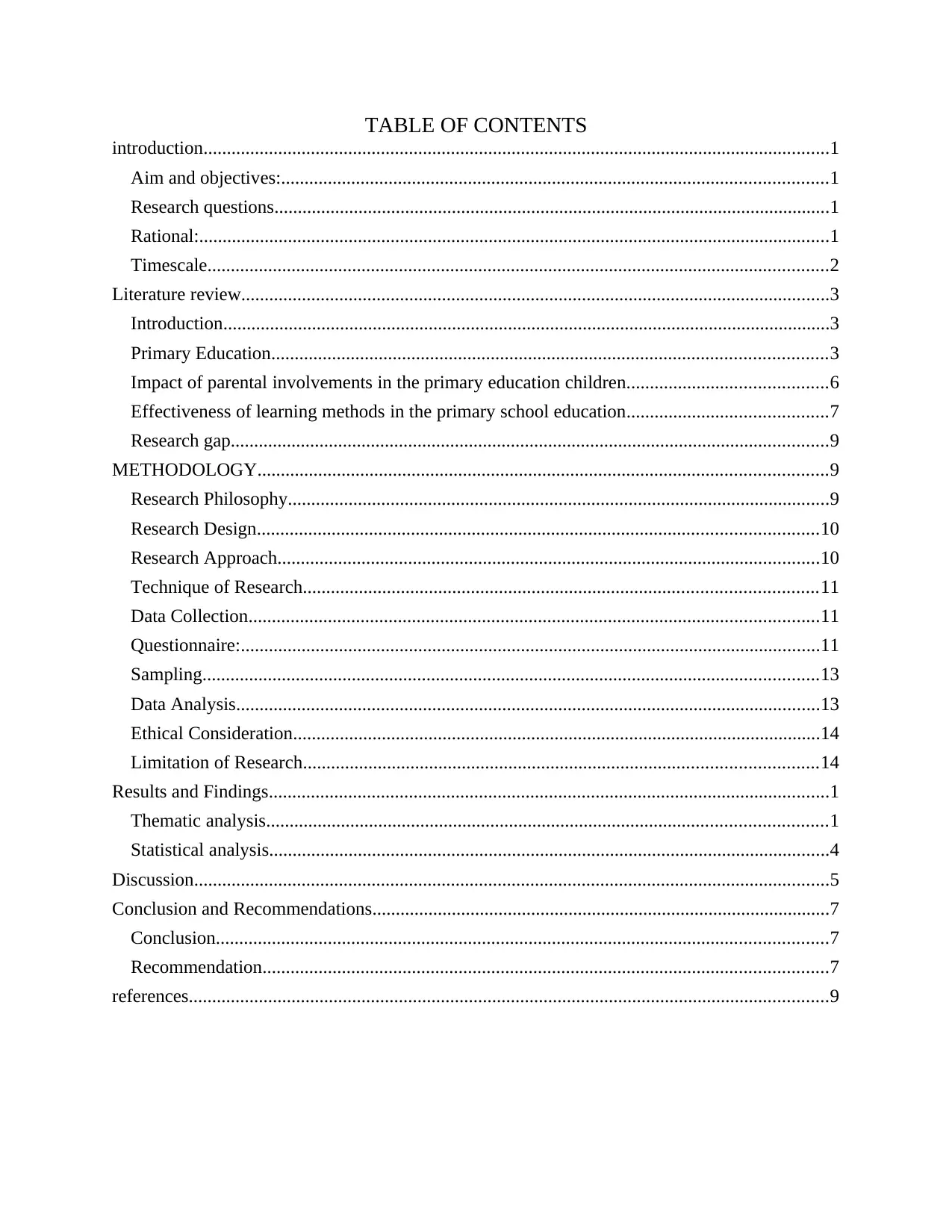
TABLE OF CONTENTS
introduction......................................................................................................................................1
Aim and objectives:.....................................................................................................................1
Research questions.......................................................................................................................1
Rational:.......................................................................................................................................1
Timescale.....................................................................................................................................2
Literature review..............................................................................................................................3
Introduction..................................................................................................................................3
Primary Education.......................................................................................................................3
Impact of parental involvements in the primary education children...........................................6
Effectiveness of learning methods in the primary school education...........................................7
Research gap................................................................................................................................9
METHODOLOGY..........................................................................................................................9
Research Philosophy....................................................................................................................9
Research Design........................................................................................................................10
Research Approach....................................................................................................................10
Technique of Research..............................................................................................................11
Data Collection..........................................................................................................................11
Questionnaire:............................................................................................................................11
Sampling....................................................................................................................................13
Data Analysis.............................................................................................................................13
Ethical Consideration.................................................................................................................14
Limitation of Research..............................................................................................................14
Results and Findings........................................................................................................................1
Thematic analysis........................................................................................................................1
Statistical analysis........................................................................................................................4
Discussion........................................................................................................................................5
Conclusion and Recommendations..................................................................................................7
Conclusion...................................................................................................................................7
Recommendation.........................................................................................................................7
references.........................................................................................................................................9
introduction......................................................................................................................................1
Aim and objectives:.....................................................................................................................1
Research questions.......................................................................................................................1
Rational:.......................................................................................................................................1
Timescale.....................................................................................................................................2
Literature review..............................................................................................................................3
Introduction..................................................................................................................................3
Primary Education.......................................................................................................................3
Impact of parental involvements in the primary education children...........................................6
Effectiveness of learning methods in the primary school education...........................................7
Research gap................................................................................................................................9
METHODOLOGY..........................................................................................................................9
Research Philosophy....................................................................................................................9
Research Design........................................................................................................................10
Research Approach....................................................................................................................10
Technique of Research..............................................................................................................11
Data Collection..........................................................................................................................11
Questionnaire:............................................................................................................................11
Sampling....................................................................................................................................13
Data Analysis.............................................................................................................................13
Ethical Consideration.................................................................................................................14
Limitation of Research..............................................................................................................14
Results and Findings........................................................................................................................1
Thematic analysis........................................................................................................................1
Statistical analysis........................................................................................................................4
Discussion........................................................................................................................................5
Conclusion and Recommendations..................................................................................................7
Conclusion...................................................................................................................................7
Recommendation.........................................................................................................................7
references.........................................................................................................................................9
⊘ This is a preview!⊘
Do you want full access?
Subscribe today to unlock all pages.

Trusted by 1+ million students worldwide
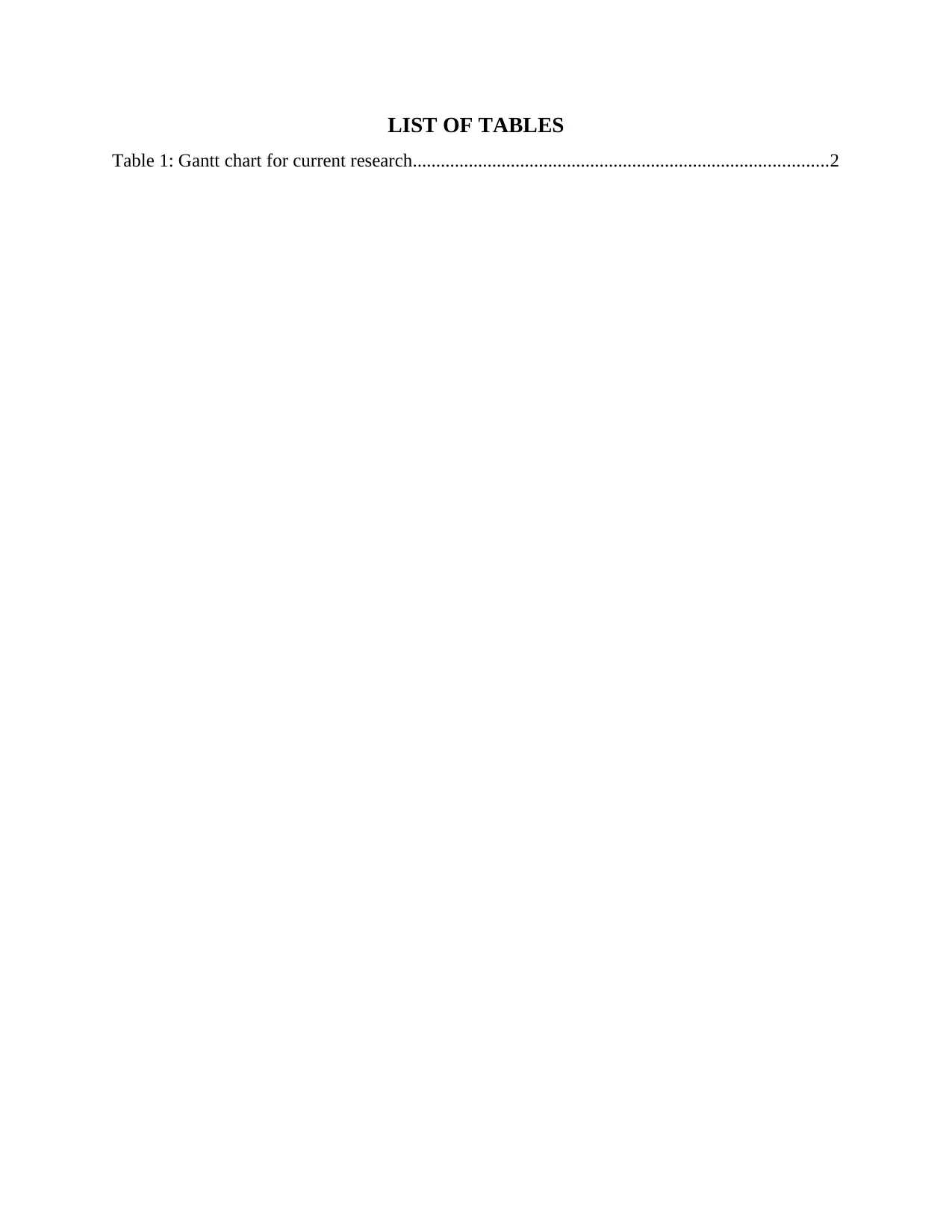
LIST OF TABLES
Table 1: Gantt chart for current research.........................................................................................2
Table 1: Gantt chart for current research.........................................................................................2
Paraphrase This Document
Need a fresh take? Get an instant paraphrase of this document with our AI Paraphraser
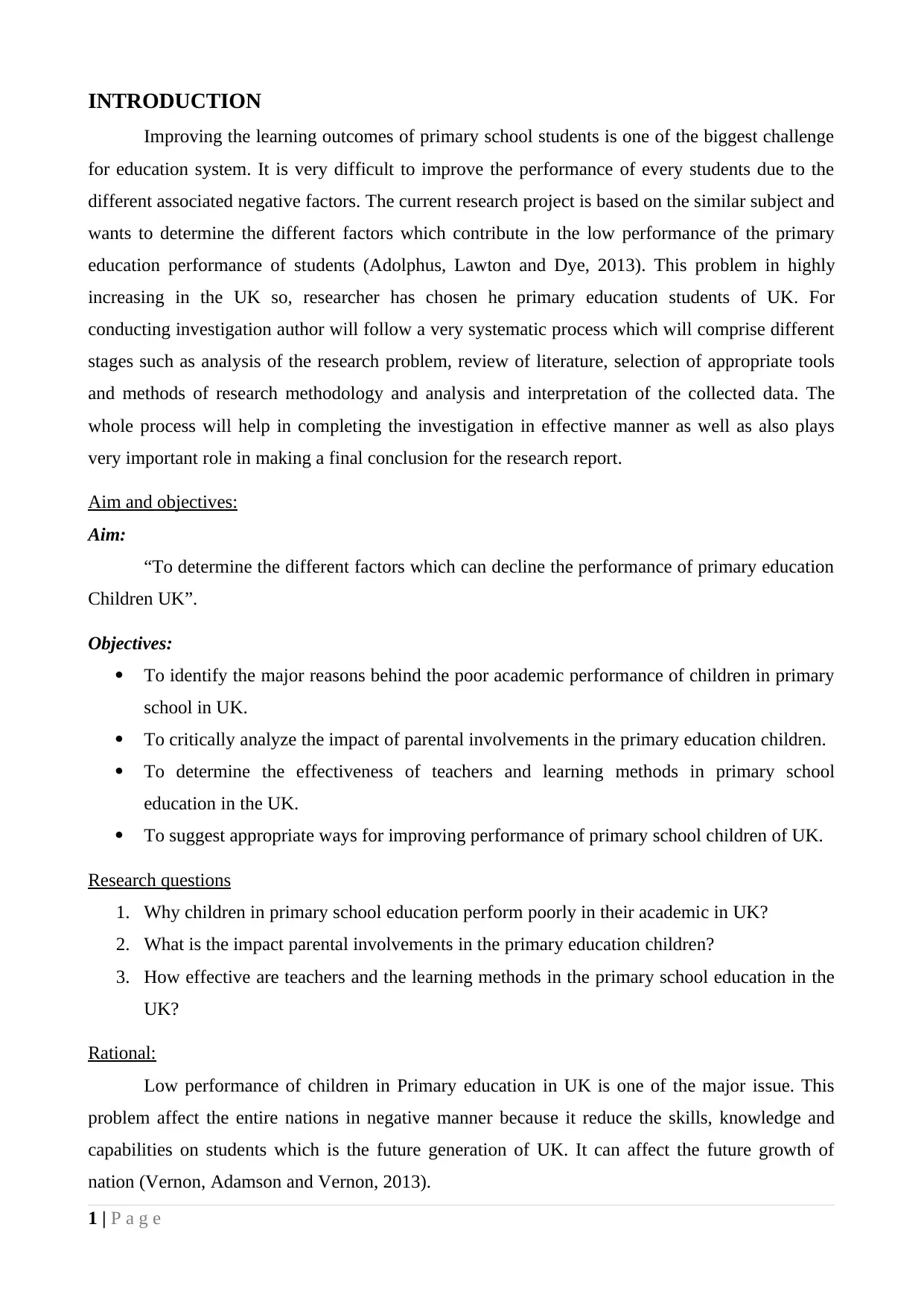
INTRODUCTION
Improving the learning outcomes of primary school students is one of the biggest challenge
for education system. It is very difficult to improve the performance of every students due to the
different associated negative factors. The current research project is based on the similar subject and
wants to determine the different factors which contribute in the low performance of the primary
education performance of students (Adolphus, Lawton and Dye, 2013). This problem in highly
increasing in the UK so, researcher has chosen he primary education students of UK. For
conducting investigation author will follow a very systematic process which will comprise different
stages such as analysis of the research problem, review of literature, selection of appropriate tools
and methods of research methodology and analysis and interpretation of the collected data. The
whole process will help in completing the investigation in effective manner as well as also plays
very important role in making a final conclusion for the research report.
Aim and objectives:
Aim:
“To determine the different factors which can decline the performance of primary education
Children UK”.
Objectives:
To identify the major reasons behind the poor academic performance of children in primary
school in UK.
To critically analyze the impact of parental involvements in the primary education children.
To determine the effectiveness of teachers and learning methods in primary school
education in the UK.
To suggest appropriate ways for improving performance of primary school children of UK.
Research questions
1. Why children in primary school education perform poorly in their academic in UK?
2. What is the impact parental involvements in the primary education children?
3. How effective are teachers and the learning methods in the primary school education in the
UK?
Rational:
Low performance of children in Primary education in UK is one of the major issue. This
problem affect the entire nations in negative manner because it reduce the skills, knowledge and
capabilities on students which is the future generation of UK. It can affect the future growth of
nation (Vernon, Adamson and Vernon, 2013).
1 | P a g e
Improving the learning outcomes of primary school students is one of the biggest challenge
for education system. It is very difficult to improve the performance of every students due to the
different associated negative factors. The current research project is based on the similar subject and
wants to determine the different factors which contribute in the low performance of the primary
education performance of students (Adolphus, Lawton and Dye, 2013). This problem in highly
increasing in the UK so, researcher has chosen he primary education students of UK. For
conducting investigation author will follow a very systematic process which will comprise different
stages such as analysis of the research problem, review of literature, selection of appropriate tools
and methods of research methodology and analysis and interpretation of the collected data. The
whole process will help in completing the investigation in effective manner as well as also plays
very important role in making a final conclusion for the research report.
Aim and objectives:
Aim:
“To determine the different factors which can decline the performance of primary education
Children UK”.
Objectives:
To identify the major reasons behind the poor academic performance of children in primary
school in UK.
To critically analyze the impact of parental involvements in the primary education children.
To determine the effectiveness of teachers and learning methods in primary school
education in the UK.
To suggest appropriate ways for improving performance of primary school children of UK.
Research questions
1. Why children in primary school education perform poorly in their academic in UK?
2. What is the impact parental involvements in the primary education children?
3. How effective are teachers and the learning methods in the primary school education in the
UK?
Rational:
Low performance of children in Primary education in UK is one of the major issue. This
problem affect the entire nations in negative manner because it reduce the skills, knowledge and
capabilities on students which is the future generation of UK. It can affect the future growth of
nation (Vernon, Adamson and Vernon, 2013).
1 | P a g e
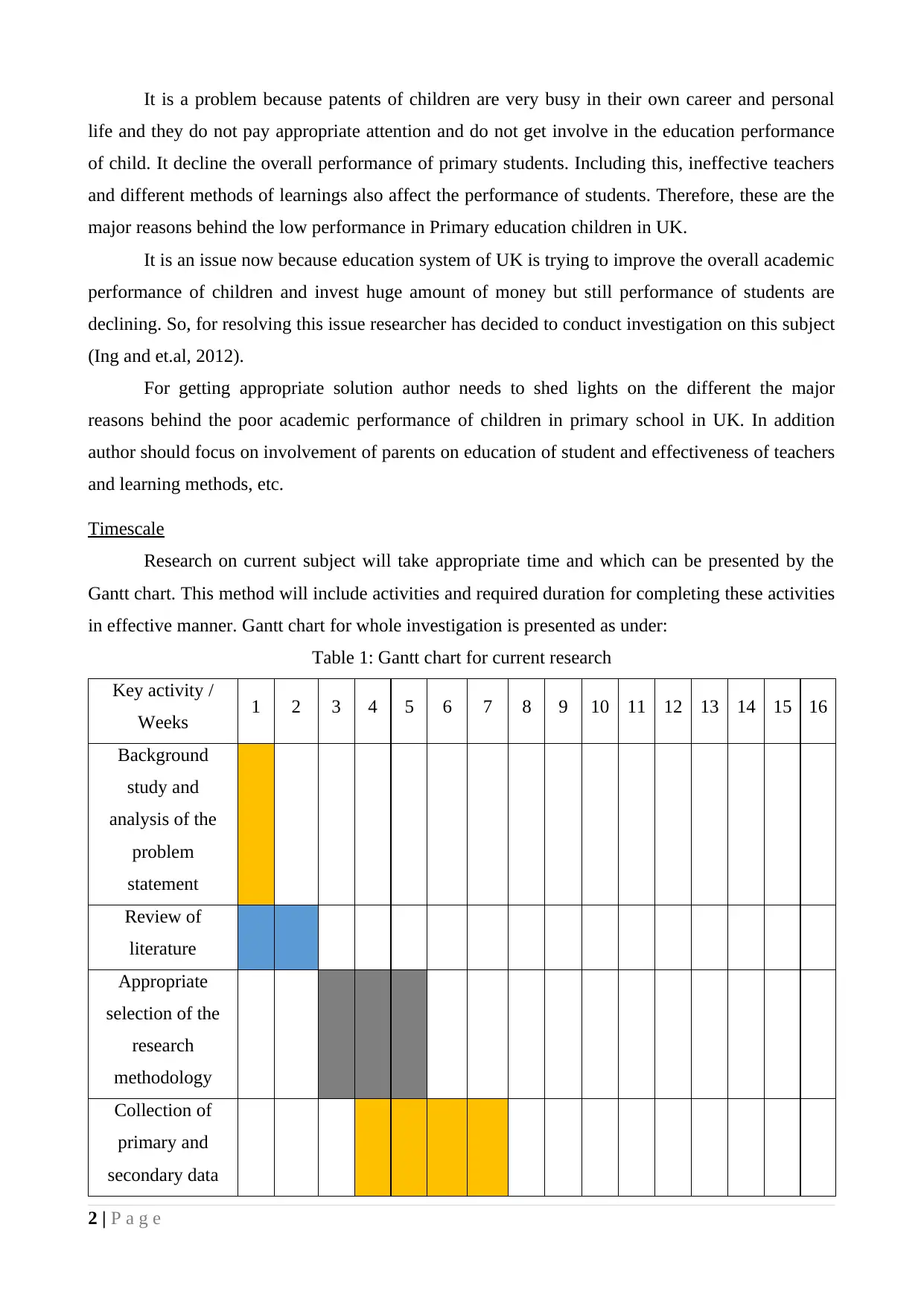
It is a problem because patents of children are very busy in their own career and personal
life and they do not pay appropriate attention and do not get involve in the education performance
of child. It decline the overall performance of primary students. Including this, ineffective teachers
and different methods of learnings also affect the performance of students. Therefore, these are the
major reasons behind the low performance in Primary education children in UK.
It is an issue now because education system of UK is trying to improve the overall academic
performance of children and invest huge amount of money but still performance of students are
declining. So, for resolving this issue researcher has decided to conduct investigation on this subject
(Ing and et.al, 2012).
For getting appropriate solution author needs to shed lights on the different the major
reasons behind the poor academic performance of children in primary school in UK. In addition
author should focus on involvement of parents on education of student and effectiveness of teachers
and learning methods, etc.
Timescale
Research on current subject will take appropriate time and which can be presented by the
Gantt chart. This method will include activities and required duration for completing these activities
in effective manner. Gantt chart for whole investigation is presented as under:
Table 1: Gantt chart for current research
Key activity /
Weeks 1 2 3 4 5 6 7 8 9 10 11 12 13 14 15 16
Background
study and
analysis of the
problem
statement
Review of
literature
Appropriate
selection of the
research
methodology
Collection of
primary and
secondary data
2 | P a g e
life and they do not pay appropriate attention and do not get involve in the education performance
of child. It decline the overall performance of primary students. Including this, ineffective teachers
and different methods of learnings also affect the performance of students. Therefore, these are the
major reasons behind the low performance in Primary education children in UK.
It is an issue now because education system of UK is trying to improve the overall academic
performance of children and invest huge amount of money but still performance of students are
declining. So, for resolving this issue researcher has decided to conduct investigation on this subject
(Ing and et.al, 2012).
For getting appropriate solution author needs to shed lights on the different the major
reasons behind the poor academic performance of children in primary school in UK. In addition
author should focus on involvement of parents on education of student and effectiveness of teachers
and learning methods, etc.
Timescale
Research on current subject will take appropriate time and which can be presented by the
Gantt chart. This method will include activities and required duration for completing these activities
in effective manner. Gantt chart for whole investigation is presented as under:
Table 1: Gantt chart for current research
Key activity /
Weeks 1 2 3 4 5 6 7 8 9 10 11 12 13 14 15 16
Background
study and
analysis of the
problem
statement
Review of
literature
Appropriate
selection of the
research
methodology
Collection of
primary and
secondary data
2 | P a g e
⊘ This is a preview!⊘
Do you want full access?
Subscribe today to unlock all pages.

Trusted by 1+ million students worldwide
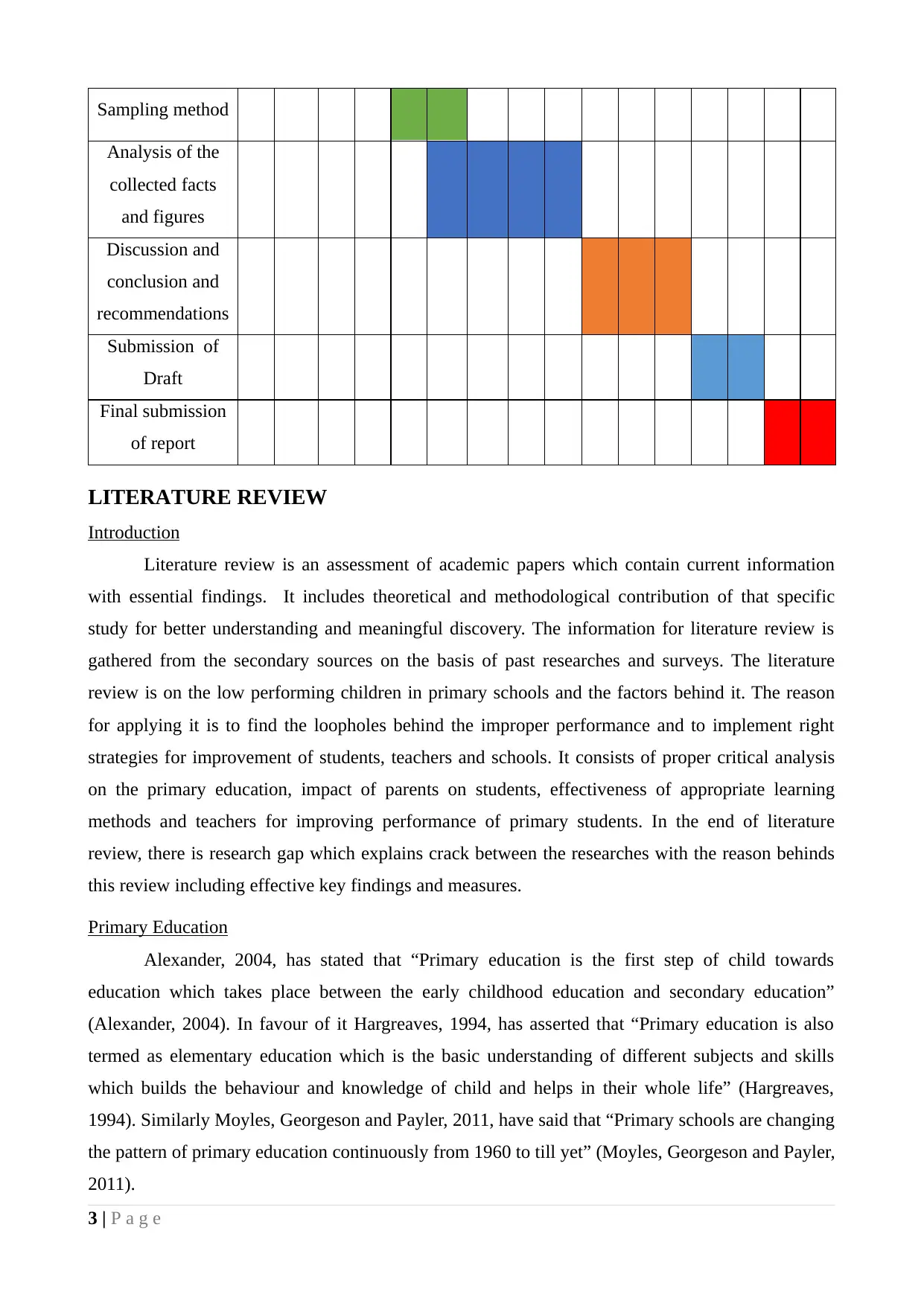
Sampling method
Analysis of the
collected facts
and figures
Discussion and
conclusion and
recommendations
Submission of
Draft
Final submission
of report
LITERATURE REVIEW
Introduction
Literature review is an assessment of academic papers which contain current information
with essential findings. It includes theoretical and methodological contribution of that specific
study for better understanding and meaningful discovery. The information for literature review is
gathered from the secondary sources on the basis of past researches and surveys. The literature
review is on the low performing children in primary schools and the factors behind it. The reason
for applying it is to find the loopholes behind the improper performance and to implement right
strategies for improvement of students, teachers and schools. It consists of proper critical analysis
on the primary education, impact of parents on students, effectiveness of appropriate learning
methods and teachers for improving performance of primary students. In the end of literature
review, there is research gap which explains crack between the researches with the reason behinds
this review including effective key findings and measures.
Primary Education
Alexander, 2004, has stated that “Primary education is the first step of child towards
education which takes place between the early childhood education and secondary education”
(Alexander, 2004). In favour of it Hargreaves, 1994, has asserted that “Primary education is also
termed as elementary education which is the basic understanding of different subjects and skills
which builds the behaviour and knowledge of child and helps in their whole life” (Hargreaves,
1994). Similarly Moyles, Georgeson and Payler, 2011, have said that “Primary schools are changing
the pattern of primary education continuously from 1960 to till yet” (Moyles, Georgeson and Payler,
2011).
3 | P a g e
Analysis of the
collected facts
and figures
Discussion and
conclusion and
recommendations
Submission of
Draft
Final submission
of report
LITERATURE REVIEW
Introduction
Literature review is an assessment of academic papers which contain current information
with essential findings. It includes theoretical and methodological contribution of that specific
study for better understanding and meaningful discovery. The information for literature review is
gathered from the secondary sources on the basis of past researches and surveys. The literature
review is on the low performing children in primary schools and the factors behind it. The reason
for applying it is to find the loopholes behind the improper performance and to implement right
strategies for improvement of students, teachers and schools. It consists of proper critical analysis
on the primary education, impact of parents on students, effectiveness of appropriate learning
methods and teachers for improving performance of primary students. In the end of literature
review, there is research gap which explains crack between the researches with the reason behinds
this review including effective key findings and measures.
Primary Education
Alexander, 2004, has stated that “Primary education is the first step of child towards
education which takes place between the early childhood education and secondary education”
(Alexander, 2004). In favour of it Hargreaves, 1994, has asserted that “Primary education is also
termed as elementary education which is the basic understanding of different subjects and skills
which builds the behaviour and knowledge of child and helps in their whole life” (Hargreaves,
1994). Similarly Moyles, Georgeson and Payler, 2011, have said that “Primary schools are changing
the pattern of primary education continuously from 1960 to till yet” (Moyles, Georgeson and Payler,
2011).
3 | P a g e
Paraphrase This Document
Need a fresh take? Get an instant paraphrase of this document with our AI Paraphraser
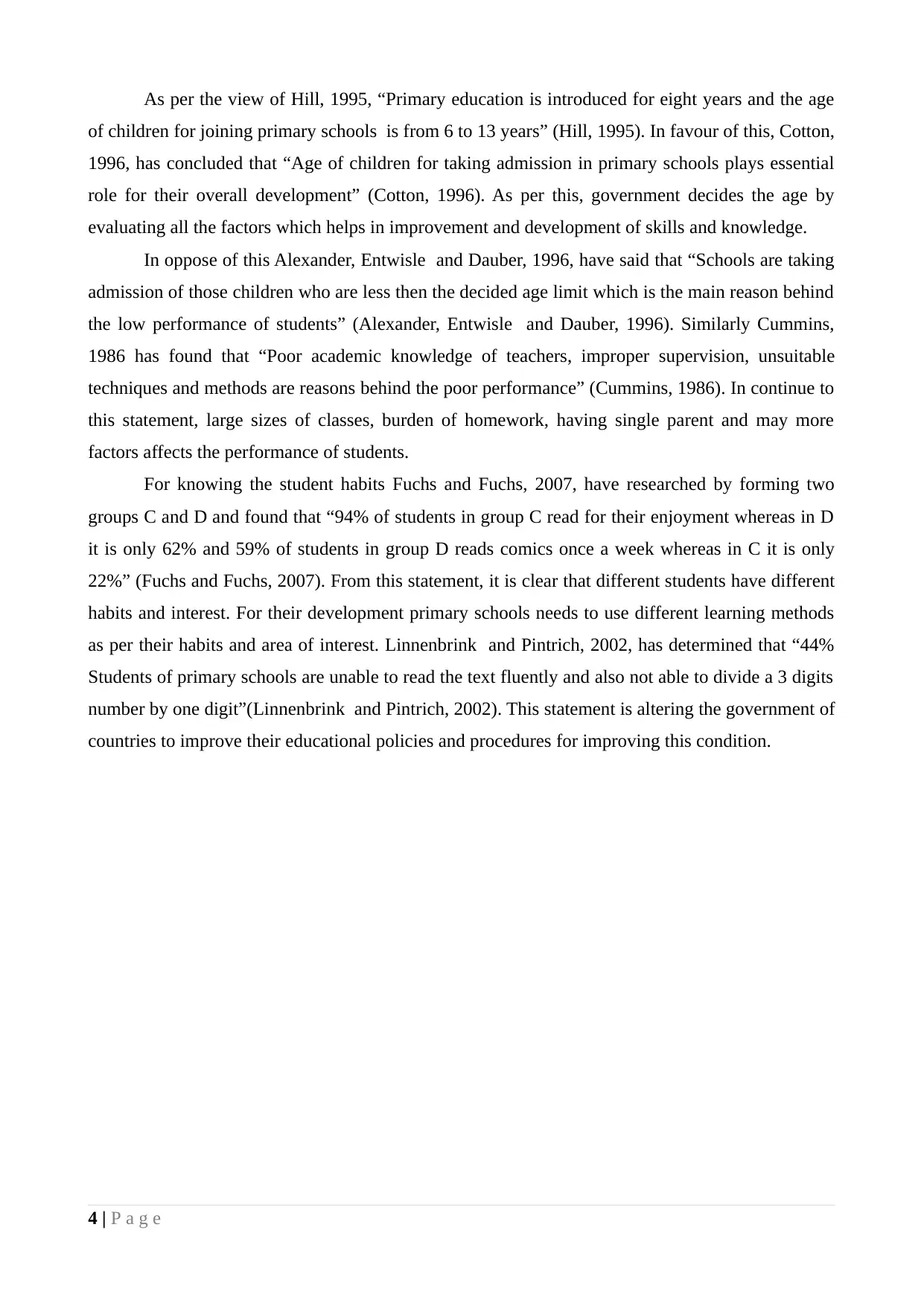
As per the view of Hill, 1995, “Primary education is introduced for eight years and the age
of children for joining primary schools is from 6 to 13 years” (Hill, 1995). In favour of this, Cotton,
1996, has concluded that “Age of children for taking admission in primary schools plays essential
role for their overall development” (Cotton, 1996). As per this, government decides the age by
evaluating all the factors which helps in improvement and development of skills and knowledge.
In oppose of this Alexander, Entwisle and Dauber, 1996, have said that “Schools are taking
admission of those children who are less then the decided age limit which is the main reason behind
the low performance of students” (Alexander, Entwisle and Dauber, 1996). Similarly Cummins,
1986 has found that “Poor academic knowledge of teachers, improper supervision, unsuitable
techniques and methods are reasons behind the poor performance” (Cummins, 1986). In continue to
this statement, large sizes of classes, burden of homework, having single parent and may more
factors affects the performance of students.
For knowing the student habits Fuchs and Fuchs, 2007, have researched by forming two
groups C and D and found that “94% of students in group C read for their enjoyment whereas in D
it is only 62% and 59% of students in group D reads comics once a week whereas in C it is only
22%” (Fuchs and Fuchs, 2007). From this statement, it is clear that different students have different
habits and interest. For their development primary schools needs to use different learning methods
as per their habits and area of interest. Linnenbrink and Pintrich, 2002, has determined that “44%
Students of primary schools are unable to read the text fluently and also not able to divide a 3 digits
number by one digit”(Linnenbrink and Pintrich, 2002). This statement is altering the government of
countries to improve their educational policies and procedures for improving this condition.
4 | P a g e
of children for joining primary schools is from 6 to 13 years” (Hill, 1995). In favour of this, Cotton,
1996, has concluded that “Age of children for taking admission in primary schools plays essential
role for their overall development” (Cotton, 1996). As per this, government decides the age by
evaluating all the factors which helps in improvement and development of skills and knowledge.
In oppose of this Alexander, Entwisle and Dauber, 1996, have said that “Schools are taking
admission of those children who are less then the decided age limit which is the main reason behind
the low performance of students” (Alexander, Entwisle and Dauber, 1996). Similarly Cummins,
1986 has found that “Poor academic knowledge of teachers, improper supervision, unsuitable
techniques and methods are reasons behind the poor performance” (Cummins, 1986). In continue to
this statement, large sizes of classes, burden of homework, having single parent and may more
factors affects the performance of students.
For knowing the student habits Fuchs and Fuchs, 2007, have researched by forming two
groups C and D and found that “94% of students in group C read for their enjoyment whereas in D
it is only 62% and 59% of students in group D reads comics once a week whereas in C it is only
22%” (Fuchs and Fuchs, 2007). From this statement, it is clear that different students have different
habits and interest. For their development primary schools needs to use different learning methods
as per their habits and area of interest. Linnenbrink and Pintrich, 2002, has determined that “44%
Students of primary schools are unable to read the text fluently and also not able to divide a 3 digits
number by one digit”(Linnenbrink and Pintrich, 2002). This statement is altering the government of
countries to improve their educational policies and procedures for improving this condition.
4 | P a g e
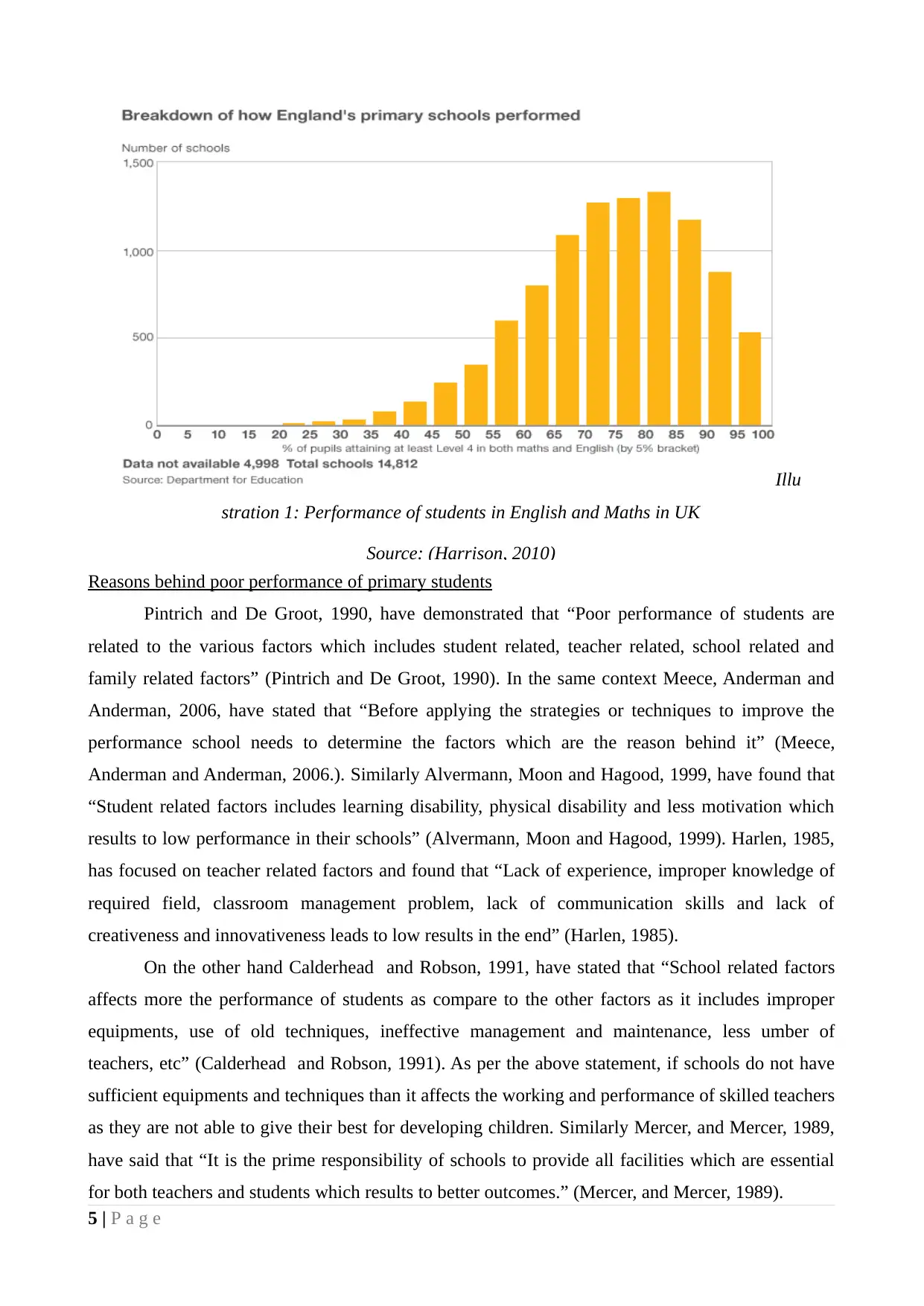
Reasons behind poor performance of primary students
Pintrich and De Groot, 1990, have demonstrated that “Poor performance of students are
related to the various factors which includes student related, teacher related, school related and
family related factors” (Pintrich and De Groot, 1990). In the same context Meece, Anderman and
Anderman, 2006, have stated that “Before applying the strategies or techniques to improve the
performance school needs to determine the factors which are the reason behind it” (Meece,
Anderman and Anderman, 2006.). Similarly Alvermann, Moon and Hagood, 1999, have found that
“Student related factors includes learning disability, physical disability and less motivation which
results to low performance in their schools” (Alvermann, Moon and Hagood, 1999). Harlen, 1985,
has focused on teacher related factors and found that “Lack of experience, improper knowledge of
required field, classroom management problem, lack of communication skills and lack of
creativeness and innovativeness leads to low results in the end” (Harlen, 1985).
On the other hand Calderhead and Robson, 1991, have stated that “School related factors
affects more the performance of students as compare to the other factors as it includes improper
equipments, use of old techniques, ineffective management and maintenance, less umber of
teachers, etc” (Calderhead and Robson, 1991). As per the above statement, if schools do not have
sufficient equipments and techniques than it affects the working and performance of skilled teachers
as they are not able to give their best for developing children. Similarly Mercer, and Mercer, 1989,
have said that “It is the prime responsibility of schools to provide all facilities which are essential
for both teachers and students which results to better outcomes.” (Mercer, and Mercer, 1989).
5 | P a g e
Illu
stration 1: Performance of students in English and Maths in UK
Source: (Harrison, 2010)
Pintrich and De Groot, 1990, have demonstrated that “Poor performance of students are
related to the various factors which includes student related, teacher related, school related and
family related factors” (Pintrich and De Groot, 1990). In the same context Meece, Anderman and
Anderman, 2006, have stated that “Before applying the strategies or techniques to improve the
performance school needs to determine the factors which are the reason behind it” (Meece,
Anderman and Anderman, 2006.). Similarly Alvermann, Moon and Hagood, 1999, have found that
“Student related factors includes learning disability, physical disability and less motivation which
results to low performance in their schools” (Alvermann, Moon and Hagood, 1999). Harlen, 1985,
has focused on teacher related factors and found that “Lack of experience, improper knowledge of
required field, classroom management problem, lack of communication skills and lack of
creativeness and innovativeness leads to low results in the end” (Harlen, 1985).
On the other hand Calderhead and Robson, 1991, have stated that “School related factors
affects more the performance of students as compare to the other factors as it includes improper
equipments, use of old techniques, ineffective management and maintenance, less umber of
teachers, etc” (Calderhead and Robson, 1991). As per the above statement, if schools do not have
sufficient equipments and techniques than it affects the working and performance of skilled teachers
as they are not able to give their best for developing children. Similarly Mercer, and Mercer, 1989,
have said that “It is the prime responsibility of schools to provide all facilities which are essential
for both teachers and students which results to better outcomes.” (Mercer, and Mercer, 1989).
5 | P a g e
Illu
stration 1: Performance of students in English and Maths in UK
Source: (Harrison, 2010)
⊘ This is a preview!⊘
Do you want full access?
Subscribe today to unlock all pages.

Trusted by 1+ million students worldwide
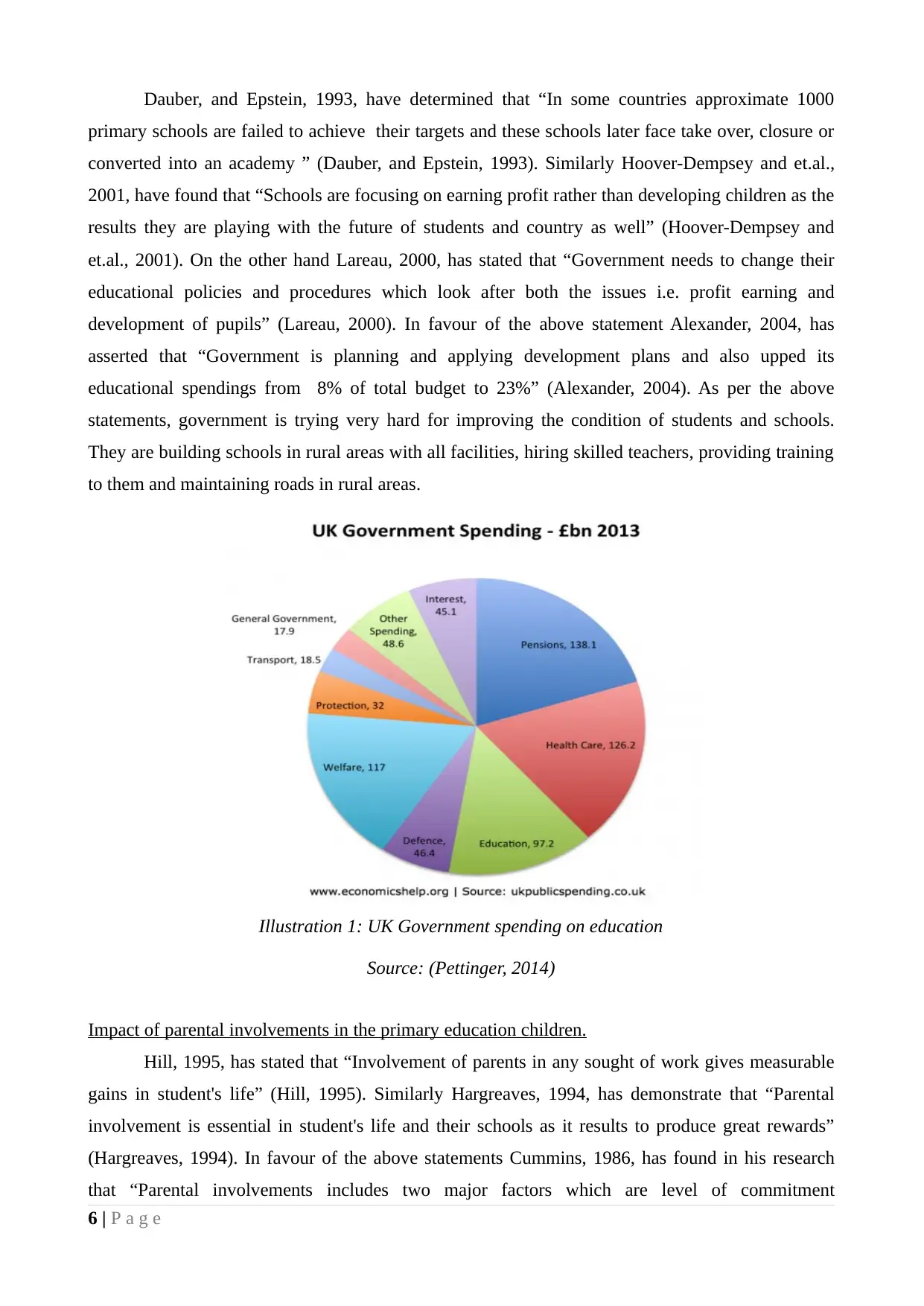
Dauber, and Epstein, 1993, have determined that “In some countries approximate 1000
primary schools are failed to achieve their targets and these schools later face take over, closure or
converted into an academy ” (Dauber, and Epstein, 1993). Similarly Hoover-Dempsey and et.al.,
2001, have found that “Schools are focusing on earning profit rather than developing children as the
results they are playing with the future of students and country as well” (Hoover-Dempsey and
et.al., 2001). On the other hand Lareau, 2000, has stated that “Government needs to change their
educational policies and procedures which look after both the issues i.e. profit earning and
development of pupils” (Lareau, 2000). In favour of the above statement Alexander, 2004, has
asserted that “Government is planning and applying development plans and also upped its
educational spendings from 8% of total budget to 23%” (Alexander, 2004). As per the above
statements, government is trying very hard for improving the condition of students and schools.
They are building schools in rural areas with all facilities, hiring skilled teachers, providing training
to them and maintaining roads in rural areas.
Impact of parental involvements in the primary education children.
Hill, 1995, has stated that “Involvement of parents in any sought of work gives measurable
gains in student's life” (Hill, 1995). Similarly Hargreaves, 1994, has demonstrate that “Parental
involvement is essential in student's life and their schools as it results to produce great rewards”
(Hargreaves, 1994). In favour of the above statements Cummins, 1986, has found in his research
that “Parental involvements includes two major factors which are level of commitment
6 | P a g e
Illustration 1: UK Government spending on education
Source: (Pettinger, 2014)
primary schools are failed to achieve their targets and these schools later face take over, closure or
converted into an academy ” (Dauber, and Epstein, 1993). Similarly Hoover-Dempsey and et.al.,
2001, have found that “Schools are focusing on earning profit rather than developing children as the
results they are playing with the future of students and country as well” (Hoover-Dempsey and
et.al., 2001). On the other hand Lareau, 2000, has stated that “Government needs to change their
educational policies and procedures which look after both the issues i.e. profit earning and
development of pupils” (Lareau, 2000). In favour of the above statement Alexander, 2004, has
asserted that “Government is planning and applying development plans and also upped its
educational spendings from 8% of total budget to 23%” (Alexander, 2004). As per the above
statements, government is trying very hard for improving the condition of students and schools.
They are building schools in rural areas with all facilities, hiring skilled teachers, providing training
to them and maintaining roads in rural areas.
Impact of parental involvements in the primary education children.
Hill, 1995, has stated that “Involvement of parents in any sought of work gives measurable
gains in student's life” (Hill, 1995). Similarly Hargreaves, 1994, has demonstrate that “Parental
involvement is essential in student's life and their schools as it results to produce great rewards”
(Hargreaves, 1994). In favour of the above statements Cummins, 1986, has found in his research
that “Parental involvements includes two major factors which are level of commitment
6 | P a g e
Illustration 1: UK Government spending on education
Source: (Pettinger, 2014)
Paraphrase This Document
Need a fresh take? Get an instant paraphrase of this document with our AI Paraphraser
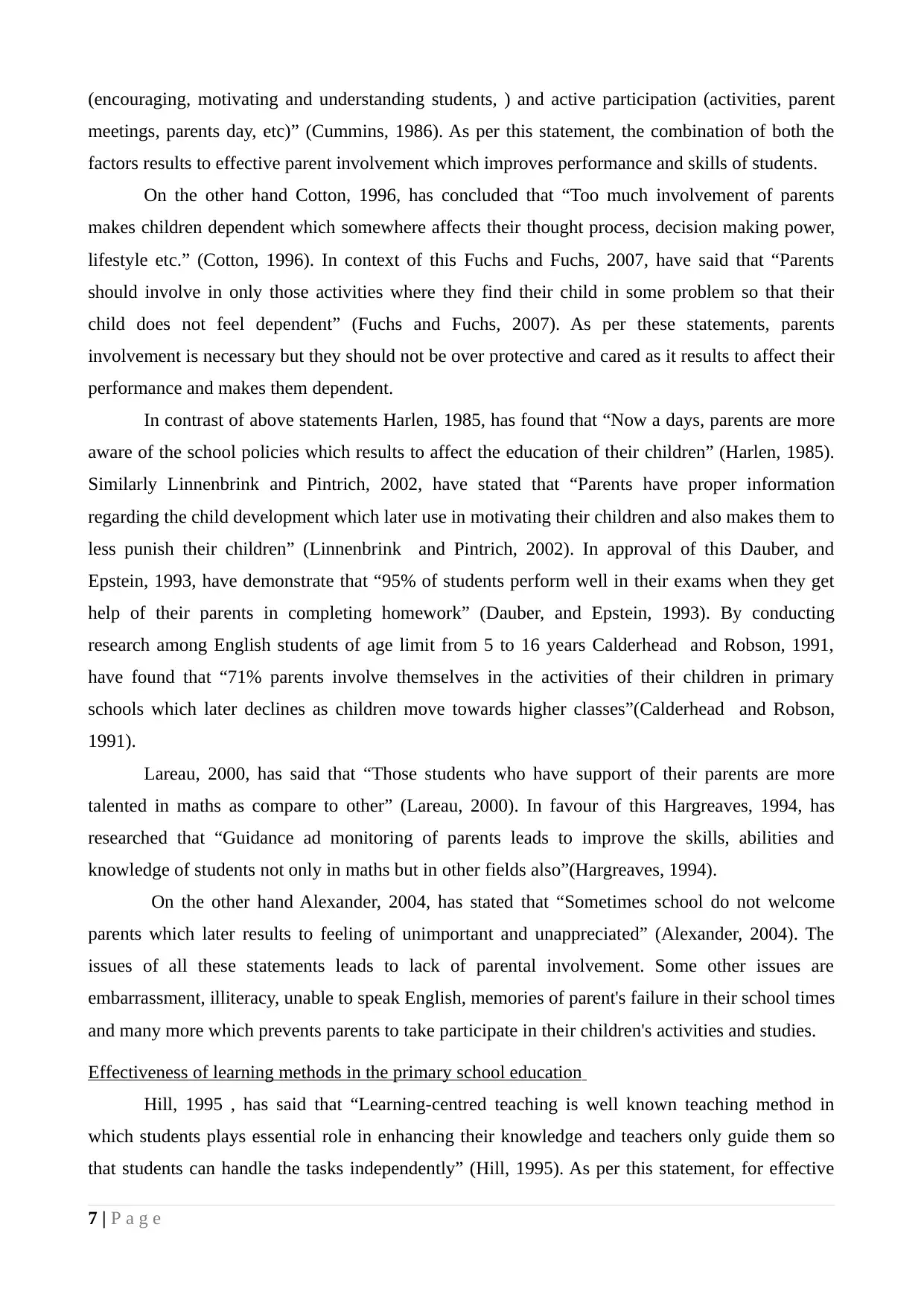
(encouraging, motivating and understanding students, ) and active participation (activities, parent
meetings, parents day, etc)” (Cummins, 1986). As per this statement, the combination of both the
factors results to effective parent involvement which improves performance and skills of students.
On the other hand Cotton, 1996, has concluded that “Too much involvement of parents
makes children dependent which somewhere affects their thought process, decision making power,
lifestyle etc.” (Cotton, 1996). In context of this Fuchs and Fuchs, 2007, have said that “Parents
should involve in only those activities where they find their child in some problem so that their
child does not feel dependent” (Fuchs and Fuchs, 2007). As per these statements, parents
involvement is necessary but they should not be over protective and cared as it results to affect their
performance and makes them dependent.
In contrast of above statements Harlen, 1985, has found that “Now a days, parents are more
aware of the school policies which results to affect the education of their children” (Harlen, 1985).
Similarly Linnenbrink and Pintrich, 2002, have stated that “Parents have proper information
regarding the child development which later use in motivating their children and also makes them to
less punish their children” (Linnenbrink and Pintrich, 2002). In approval of this Dauber, and
Epstein, 1993, have demonstrate that “95% of students perform well in their exams when they get
help of their parents in completing homework” (Dauber, and Epstein, 1993). By conducting
research among English students of age limit from 5 to 16 years Calderhead and Robson, 1991,
have found that “71% parents involve themselves in the activities of their children in primary
schools which later declines as children move towards higher classes”(Calderhead and Robson,
1991).
Lareau, 2000, has said that “Those students who have support of their parents are more
talented in maths as compare to other” (Lareau, 2000). In favour of this Hargreaves, 1994, has
researched that “Guidance ad monitoring of parents leads to improve the skills, abilities and
knowledge of students not only in maths but in other fields also”(Hargreaves, 1994).
On the other hand Alexander, 2004, has stated that “Sometimes school do not welcome
parents which later results to feeling of unimportant and unappreciated” (Alexander, 2004). The
issues of all these statements leads to lack of parental involvement. Some other issues are
embarrassment, illiteracy, unable to speak English, memories of parent's failure in their school times
and many more which prevents parents to take participate in their children's activities and studies.
Effectiveness of learning methods in the primary school education
Hill, 1995 , has said that “Learning-centred teaching is well known teaching method in
which students plays essential role in enhancing their knowledge and teachers only guide them so
that students can handle the tasks independently” (Hill, 1995). As per this statement, for effective
7 | P a g e
meetings, parents day, etc)” (Cummins, 1986). As per this statement, the combination of both the
factors results to effective parent involvement which improves performance and skills of students.
On the other hand Cotton, 1996, has concluded that “Too much involvement of parents
makes children dependent which somewhere affects their thought process, decision making power,
lifestyle etc.” (Cotton, 1996). In context of this Fuchs and Fuchs, 2007, have said that “Parents
should involve in only those activities where they find their child in some problem so that their
child does not feel dependent” (Fuchs and Fuchs, 2007). As per these statements, parents
involvement is necessary but they should not be over protective and cared as it results to affect their
performance and makes them dependent.
In contrast of above statements Harlen, 1985, has found that “Now a days, parents are more
aware of the school policies which results to affect the education of their children” (Harlen, 1985).
Similarly Linnenbrink and Pintrich, 2002, have stated that “Parents have proper information
regarding the child development which later use in motivating their children and also makes them to
less punish their children” (Linnenbrink and Pintrich, 2002). In approval of this Dauber, and
Epstein, 1993, have demonstrate that “95% of students perform well in their exams when they get
help of their parents in completing homework” (Dauber, and Epstein, 1993). By conducting
research among English students of age limit from 5 to 16 years Calderhead and Robson, 1991,
have found that “71% parents involve themselves in the activities of their children in primary
schools which later declines as children move towards higher classes”(Calderhead and Robson,
1991).
Lareau, 2000, has said that “Those students who have support of their parents are more
talented in maths as compare to other” (Lareau, 2000). In favour of this Hargreaves, 1994, has
researched that “Guidance ad monitoring of parents leads to improve the skills, abilities and
knowledge of students not only in maths but in other fields also”(Hargreaves, 1994).
On the other hand Alexander, 2004, has stated that “Sometimes school do not welcome
parents which later results to feeling of unimportant and unappreciated” (Alexander, 2004). The
issues of all these statements leads to lack of parental involvement. Some other issues are
embarrassment, illiteracy, unable to speak English, memories of parent's failure in their school times
and many more which prevents parents to take participate in their children's activities and studies.
Effectiveness of learning methods in the primary school education
Hill, 1995 , has said that “Learning-centred teaching is well known teaching method in
which students plays essential role in enhancing their knowledge and teachers only guide them so
that students can handle the tasks independently” (Hill, 1995). As per this statement, for effective
7 | P a g e
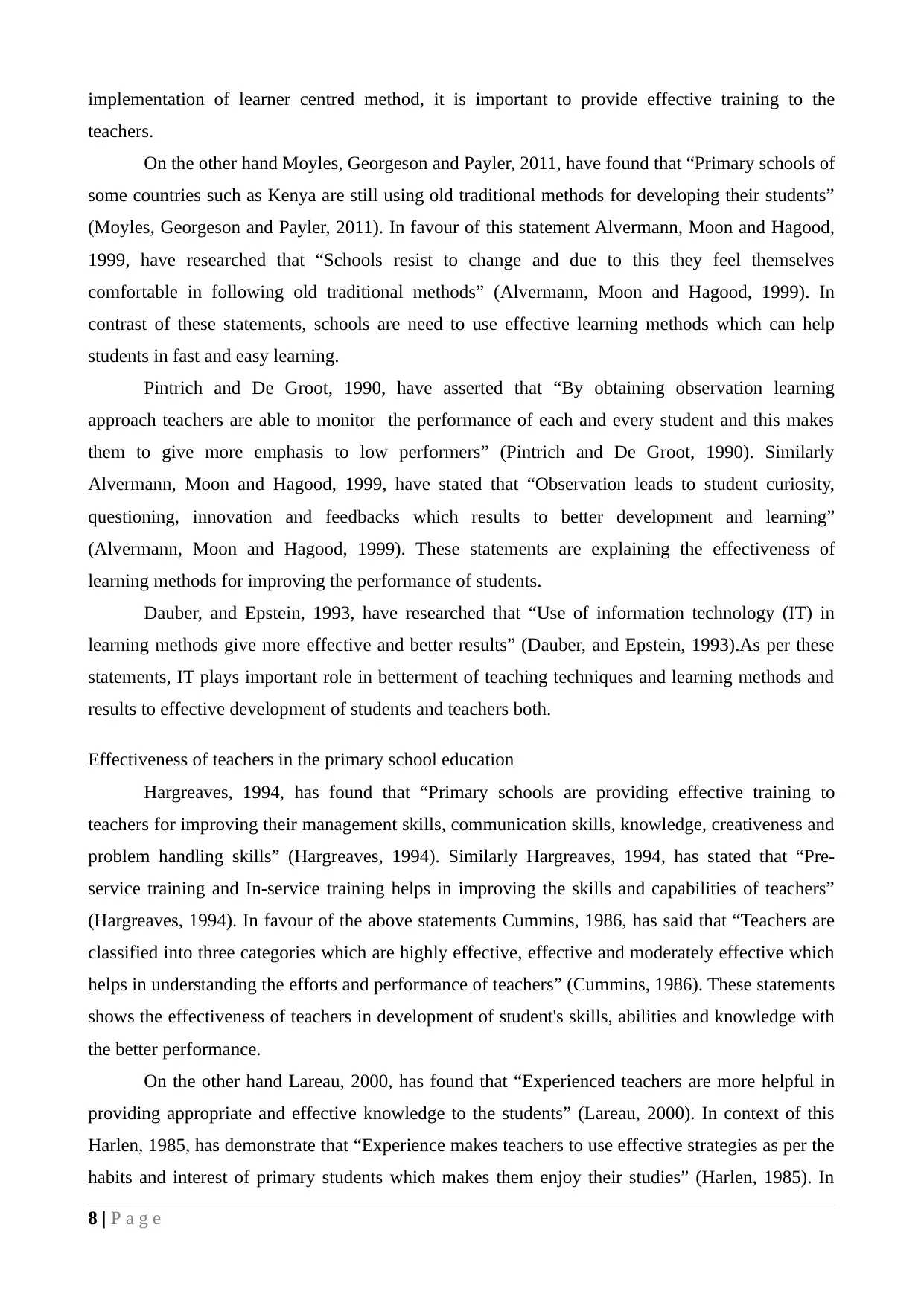
implementation of learner centred method, it is important to provide effective training to the
teachers.
On the other hand Moyles, Georgeson and Payler, 2011, have found that “Primary schools of
some countries such as Kenya are still using old traditional methods for developing their students”
(Moyles, Georgeson and Payler, 2011). In favour of this statement Alvermann, Moon and Hagood,
1999, have researched that “Schools resist to change and due to this they feel themselves
comfortable in following old traditional methods” (Alvermann, Moon and Hagood, 1999). In
contrast of these statements, schools are need to use effective learning methods which can help
students in fast and easy learning.
Pintrich and De Groot, 1990, have asserted that “By obtaining observation learning
approach teachers are able to monitor the performance of each and every student and this makes
them to give more emphasis to low performers” (Pintrich and De Groot, 1990). Similarly
Alvermann, Moon and Hagood, 1999, have stated that “Observation leads to student curiosity,
questioning, innovation and feedbacks which results to better development and learning”
(Alvermann, Moon and Hagood, 1999). These statements are explaining the effectiveness of
learning methods for improving the performance of students.
Dauber, and Epstein, 1993, have researched that “Use of information technology (IT) in
learning methods give more effective and better results” (Dauber, and Epstein, 1993).As per these
statements, IT plays important role in betterment of teaching techniques and learning methods and
results to effective development of students and teachers both.
Effectiveness of teachers in the primary school education
Hargreaves, 1994, has found that “Primary schools are providing effective training to
teachers for improving their management skills, communication skills, knowledge, creativeness and
problem handling skills” (Hargreaves, 1994). Similarly Hargreaves, 1994, has stated that “Pre-
service training and In-service training helps in improving the skills and capabilities of teachers”
(Hargreaves, 1994). In favour of the above statements Cummins, 1986, has said that “Teachers are
classified into three categories which are highly effective, effective and moderately effective which
helps in understanding the efforts and performance of teachers” (Cummins, 1986). These statements
shows the effectiveness of teachers in development of student's skills, abilities and knowledge with
the better performance.
On the other hand Lareau, 2000, has found that “Experienced teachers are more helpful in
providing appropriate and effective knowledge to the students” (Lareau, 2000). In context of this
Harlen, 1985, has demonstrate that “Experience makes teachers to use effective strategies as per the
habits and interest of primary students which makes them enjoy their studies” (Harlen, 1985). In
8 | P a g e
teachers.
On the other hand Moyles, Georgeson and Payler, 2011, have found that “Primary schools of
some countries such as Kenya are still using old traditional methods for developing their students”
(Moyles, Georgeson and Payler, 2011). In favour of this statement Alvermann, Moon and Hagood,
1999, have researched that “Schools resist to change and due to this they feel themselves
comfortable in following old traditional methods” (Alvermann, Moon and Hagood, 1999). In
contrast of these statements, schools are need to use effective learning methods which can help
students in fast and easy learning.
Pintrich and De Groot, 1990, have asserted that “By obtaining observation learning
approach teachers are able to monitor the performance of each and every student and this makes
them to give more emphasis to low performers” (Pintrich and De Groot, 1990). Similarly
Alvermann, Moon and Hagood, 1999, have stated that “Observation leads to student curiosity,
questioning, innovation and feedbacks which results to better development and learning”
(Alvermann, Moon and Hagood, 1999). These statements are explaining the effectiveness of
learning methods for improving the performance of students.
Dauber, and Epstein, 1993, have researched that “Use of information technology (IT) in
learning methods give more effective and better results” (Dauber, and Epstein, 1993).As per these
statements, IT plays important role in betterment of teaching techniques and learning methods and
results to effective development of students and teachers both.
Effectiveness of teachers in the primary school education
Hargreaves, 1994, has found that “Primary schools are providing effective training to
teachers for improving their management skills, communication skills, knowledge, creativeness and
problem handling skills” (Hargreaves, 1994). Similarly Hargreaves, 1994, has stated that “Pre-
service training and In-service training helps in improving the skills and capabilities of teachers”
(Hargreaves, 1994). In favour of the above statements Cummins, 1986, has said that “Teachers are
classified into three categories which are highly effective, effective and moderately effective which
helps in understanding the efforts and performance of teachers” (Cummins, 1986). These statements
shows the effectiveness of teachers in development of student's skills, abilities and knowledge with
the better performance.
On the other hand Lareau, 2000, has found that “Experienced teachers are more helpful in
providing appropriate and effective knowledge to the students” (Lareau, 2000). In context of this
Harlen, 1985, has demonstrate that “Experience makes teachers to use effective strategies as per the
habits and interest of primary students which makes them enjoy their studies” (Harlen, 1985). In
8 | P a g e
⊘ This is a preview!⊘
Do you want full access?
Subscribe today to unlock all pages.

Trusted by 1+ million students worldwide
1 out of 30
Related Documents
Your All-in-One AI-Powered Toolkit for Academic Success.
+13062052269
info@desklib.com
Available 24*7 on WhatsApp / Email
![[object Object]](/_next/static/media/star-bottom.7253800d.svg)
Unlock your academic potential
Copyright © 2020–2025 A2Z Services. All Rights Reserved. Developed and managed by ZUCOL.




